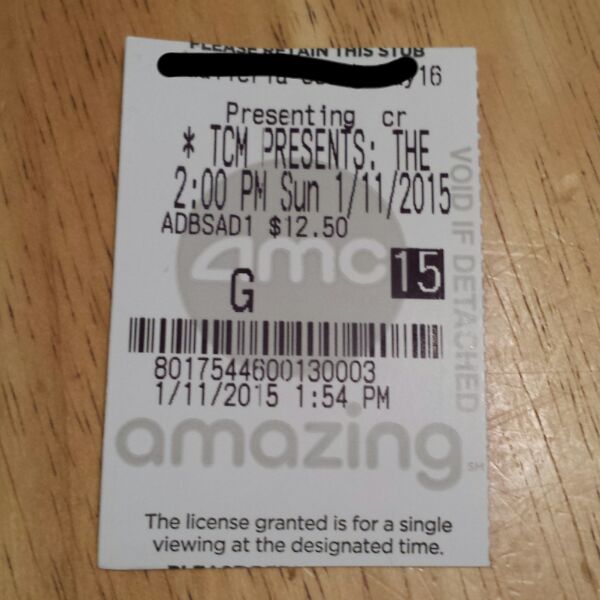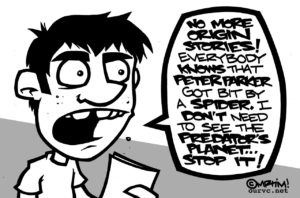We went to see a 75th Anniversary screening of The Wizard of Oz over the weekend. Not that you could tell from this ticket stub. But hey, they made sure you knew it was presented by TCM, right? *sigh*
Tag: movies
They Didn’t Know What They Were Getting Into: the Woods
Despite an overall 7.0 rating, there are a slew of one– and two-star reviews of Into the Woods on IMDB. Did these people see the same movie I did? As I looked through several pages seemingly sorted by rating, a few common threads emerged:
1. Too much singing! It’s a musical. Unfortunately, the trailers seemed to be trying to hide this fact.
2. It wasn’t a fluffy, happy family movie. Well, no. It’s supposed to be a darker, more complex take on the stories. Again, the ad campaign wasn’t entirely clear on this, and several people said they had expected it to be kid-friendly because of the Disney name. That says something about the power of the Disney brand (especially when associated with fairy tales), and makes me wonder if it would have been better to release it through, say, Touchstone.
Interestingly, the things people were most upset by are things that were toned down (or moved off-screen) from the stage version. I guess the studio shouldn’t have bothered with those notes. And one recurring complaint, Cinderella’s stepsisters’ more extreme efforts to get into the shoe, is actually in the Brothers Grimm version (where her name is translated as Ashputtel).
Those two threads are a failure of the ad campaign to prepare people for what they were going to see. (Though the viewers complaining that it’s “not PG” seem a little unclear on the concept of “Parental Guidance suggested: Some material may not be suitable for children.”) But then there’s this…
3. It should have stopped before the final act. That would be missing the point, which is to follow through with the consequences of what everyone did in act one, and the personality traits that brought them through it.
Consider: How does Cinderella fit in with the royal family? How does Red Riding Hood deal with the trauma of her experience with the wolf? How is Rapunzel affected by her life in isolation? The baker and his wife had a lot of trouble working together just to get their child; how are they going to handle raising him? The princes are still going to be charming, and they’re accustomed to the chase. And when you come down to it, Jack broke into someone’s house, stole a bunch of stuff, and then killed him.
Admittedly, the second act isn’t as strong in the movie as it is in the play, because they cut out a lot of it…but I’ve heard the same complaint leveled at the show. That would be like cutting the second act of The Fantasticks. You could perform just the first act, sure, but it would be much less meaningful.
Once you get to the three-star reviews, you find more people who still didn’t like it, but understood what it was supposed to be. They didn’t like the performances, or thought the story structure didn’t hang together, or just don’t like Sondheim, or knew it was going to be a darker take but still didn’t like it. Fair enough. Everyone has different tastes, and what works for one viewer doesn’t always work for someone else. But at least they disliked it for what it was, not for what it wasn’t.
Though it would help if the ads had been a bit more clear.
Jack vs the Idiot Ball
Jack the Giant Slayer isn’t a great movie by any stretch, but it’s a fun, escapist adventure that doesn’t take itself too seriously most of the time. Something that struck me as really unusual, though, is that once the story gets going, the plot never depends on major characters holding the idiot ball. There are complications galore, and there’s the dumb sidekick for the villain (think Pinky and Jafar), but generally speaking, the main characters are competent, at least in terms of their respective specialties and common sense. The complications arise not from people doing stupid things when they should know better, but from unforeseen circumstances and the scheming, strength, or skills of their opponents.
People see through poor disguises, get suspicious about the turncoat, take measures to actually protect the kingdom from invasion when they get wind of the danger, and so on.
Compare this to, for example, Prometheus, in which highly trained scientists take their helmets off on an alien planet and try to pet the unidentified creatures they find while they’re lost in an underground warren even though they have a map. Talk about too stupid to live.
A Wicked Weekend
 I’ve been catching up on last year’s movies. I finally saw Frozen last week, which prompted me to track down the soundtracks to both that movie and Tangled (more about that later), and listening to those prompted me to dig out the cast album for Wicked for the first time in, well, forever.
I’ve been catching up on last year’s movies. I finally saw Frozen last week, which prompted me to track down the soundtracks to both that movie and Tangled (more about that later), and listening to those prompted me to dig out the cast album for Wicked for the first time in, well, forever.
I was reminded of why I hadn’t listened to it much. Aside from a handful of songs (“Corner of the Sky” and “Colors of the Wind” come to mind immediately), something about Stephen Schwartz’s music just doesn’t stick in my head, and Wicked isn’t an exception. No matter that I like the story, that I like the characters, that I like Idina Menzel and Kristin Chenoweth…the songs just don’t stick. Not even “Defying Gravity,” except for the title refrain.
But remember how I mentioned I was catching up on last year’s movies? I had a disc out from Netflix of Oz: The Great and Powerful, and several episodes of Once Upon a Time on the DVR…the ones introducing the Wicked Witch as the villain for this half of the season. And it was weekend of Emerald City Comicon.
It seemed appropriate to continue catching up.
For the record, so far I much prefer Zelena (OUAT) to Theodora (Oz:TGAP) as far as characterization goes (she has some), though I haven’t seen enough to decide how she stacks up against Elphaba.
No More Origin Stories
It’s bothered me for a long time that movie studios seem to think the only story worth telling about a superhero is the origin. You get a trilogy if you’re lucky, then back to another origin take. It would be like only ever running the pilot of every TV show even though they’re designed to set things up for an extended run. Or, I don’t know, remaking the prologue of Les Misérables over and over again without ever going further with Jean Valjean.

